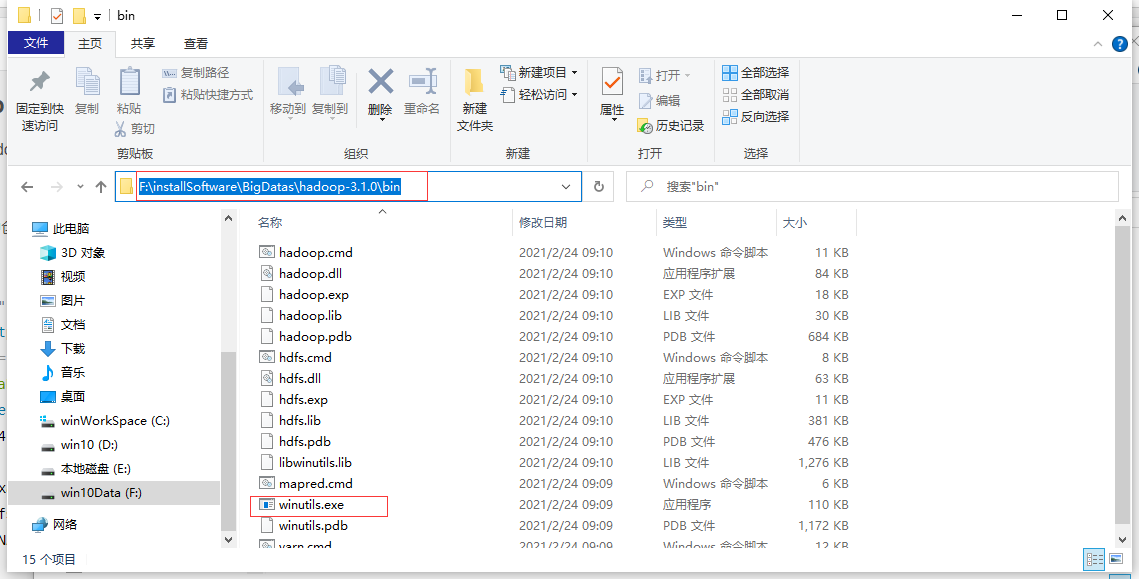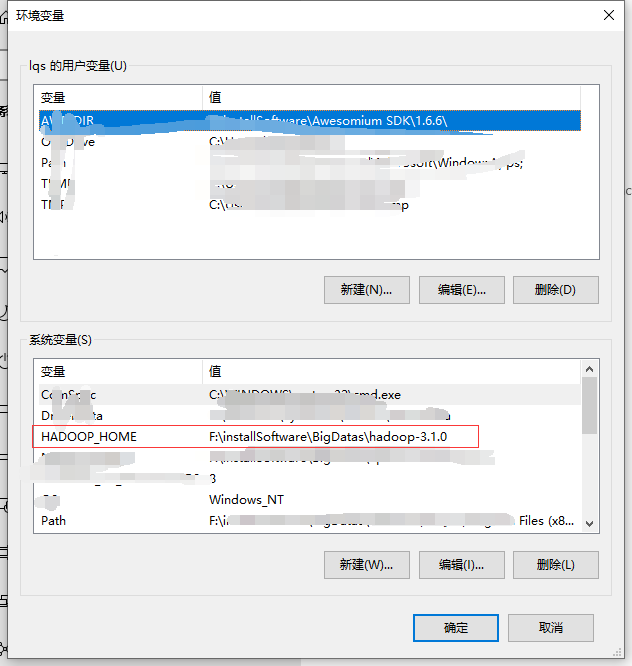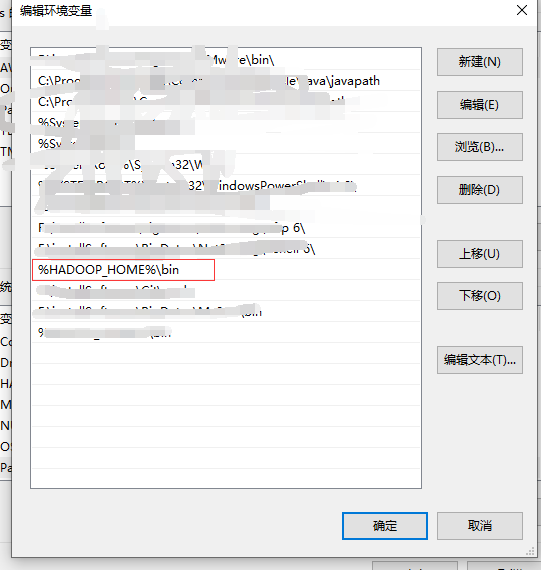Before using hadoop API, configure the dependency of Windows
Windows-hadoop-3.1.0
Alicloud download link: Windows-hadoop-3.1.0
CSDN download link: Windows-hadoop-3.1.0
1. Download Windows-hadoop-3.1.0 and extract it to your installation directory

Configure the following environment variables:


Finally, click the exe file drawn in the first picture box. If there is no error, the configuration is successful.
IDEA_Maven_Hadooop_API
pom.xml file configuration
1. Before use, create Maven project (Project Name: HdfsClientDemo) in idea. First configure it in pom.xml as follows:
<?xml version="1.0" encoding="UTF-8"?>
<project xmlns="http://maven.apache.org/POM/4.0.0"
xmlns:xsi="http://www.w3.org/2001/XMLSchema-instance"
xsi:schemaLocation="http://maven.apache.org/POM/4.0.0 http://maven.apache.org/xsd/maven-4.0.0.xsd">
<modelVersion>4.0.0</modelVersion>
<groupId>org.example</groupId>
<artifactId>HdfsClientDemo</artifactId>
<version>1.0-SNAPSHOT</version>
<properties>
<maven.compiler.source>8</maven.compiler.source>
<maven.compiler.target>8</maven.compiler.target>
</properties>
<dependencies>
<!-- to configure hadoop API Related plug-ins -->
<dependency>
<groupId>org.apache.hadoop</groupId>
<artifactId>hadoop-client</artifactId>
<version>3.1.3</version>
</dependency>
<dependency>
<groupId>junit</groupId>
<artifactId>junit</artifactId>
<version>4.12</version>
</dependency>
<dependency>
<groupId>org.slf4j</groupId>
<artifactId>slf4j-log4j12</artifactId>
<version>1.7.30</version>
</dependency>
</dependencies>
</project>
Description of tool class com.lqs.util.hadoop util
be careful:
Used in the following code
//Close resource
HadoopUtil.close(fs);
This is a tool class written by myself. The content is as follows:
//
// Source code recreated from a .class file by IntelliJ IDEA
// (powered by FernFlower decompiler)
//
package com.lqs.util;
import java.io.IOException;
import org.apache.hadoop.fs.FileSystem;
public class HadoopUtil {
private HadoopUtil() {
}
public static void close(FileSystem fileSystem) {
try {
if (fileSystem != null) {
fileSystem.close();
System.out.println("close hadoop hdfs File remote connection succeeded...");
}
} catch (IOException e) {
System.out.println("close hadoop hdfs File remote connection failed...\n The reasons are as follows:" + e);
}
}
}
configuration file
2. Then create the configuration file log4j.properties under the path HdfsClientDemo\src\main\resources, and add the following contents:
log4j.rootLogger=INFO, stdout log4j.appender.stdout=org.apache.log4j.ConsoleAppender log4j.appender.stdout.layout=org.apache.log4j.PatternLayout log4j.appender.stdout.layout.ConversionPattern=%d %p [%c] - %m%n log4j.appender.logfile=org.apache.log4j.FileAppender log4j.appender.logfile.File=target/spring.log log4j.appender.logfile.layout=org.apache.log4j.PatternLayout log4j.appender.logfile.layout.ConversionPattern=%d %p [%c] - %m%n
folders creating
3. Create the folder class file HdfsClient.java under the \ src\main\java path, and enter the following
package com.lqs.hdfs;
import com.lqs.util.HadoopUtil;
import org.apache.hadoop.conf.Configuration;
import org.apache.hadoop.fs.FileSystem;
import org.apache.hadoop.fs.Path;
import org.junit.Test;
import java.io.IOException;
import java.net.URI;
import java.net.URISyntaxException;
/**
* @author qingSong liu
* @version 1.0
* @time 2021/12/7 10:51
*
* This is the test connection
*/
public class HdfsClient {
@Test
public void testMkdirs() throws IOException, URISyntaxException, InterruptedException {
//1. Get file system
Configuration configuration = new Configuration();
// FileSystem fileSystem = FileSystem.get(new URI("hdfs://bdc112:8020"), configuration);
FileSystem fs = FileSystem.get(new URI("hdfs://bdc112:8020"), configuration, "lqs");
//Perform the create directory operation
fs.mkdirs(new Path("/test/test1/lqs.txt"));
//close resource
HadoopUtil.close(fs);
}
}
File upload
4. Create the folder class file HdfsClientUpload.java under the \ src\main\java path, and enter the following
package com.lqs.hdfs;
import com.lqs.util.HadoopUtil;
import org.apache.hadoop.conf.Configuration;
import org.apache.hadoop.fs.FileSystem;
import org.apache.hadoop.fs.Path;
import org.junit.Test;
import java.io.IOException;
import java.net.URI;
import java.net.URISyntaxException;
/**
* @author qingSong liu
* @version 1.0
* @time 2021/12/7 16:24
*/
public class HdfsClientUpload {
@Test
public void testCopyFromLocalFile() throws URISyntaxException, IOException, InterruptedException {
//1. Get file system
Configuration configuration = new Configuration();
configuration.set("dfs.replication", "2");
FileSystem fs = FileSystem.get(new URI("hdfs://bdc112:8020"), configuration, "lqs");
//Perform file upload operation
fs.copyFromLocalFile(new Path("F:\\test\\lqs.txt"), new Path("/test/test1"));
//close resource
HadoopUtil.close(fs);
}
}
File download
5. Create the folder class file HdfsClientDownload.java under the \ src\main\java path, and enter the following
package com.lqs.hdfs;
import com.lqs.util.HadoopUtil;
import org.apache.hadoop.conf.Configuration;
import org.apache.hadoop.fs.FileSystem;
import org.apache.hadoop.fs.Path;
import org.junit.Test;
import java.io.IOException;
import java.net.URI;
import java.net.URISyntaxException;
/**
* @author qingSong liu
* @version 1.0
* @time 2021/12/7 16:10
*/
public class HdfsClientDownload {
@Test
public void testCopyToLocalFile() throws URISyntaxException, IOException, InterruptedException {
//1. Get file system
Configuration configuration = new Configuration();
FileSystem fs = FileSystem.get(new URI("hdfs://bdc112:8020"), configuration, "lqs");
//2. Perform download operation
// boolean delSrc indicates whether to delete the original file
// Path src refers to the path of the file to download
// Path dst refers to the path to which the file is downloaded
// boolean useRawLocalFileSystem whether to enable file verification
fs.copyToLocalFile(false, new Path("/test/test1/lqs.txt"), new Path("f:/lqs.txt"), true);
//3. Close resource
HadoopUtil.close(fs);
}
}
File (folder) deletion
6. Create the class file HdfsClientDelete.java to create the folder under the \ src\main\java path, and enter the following:
package com.lqs.hdfs;
import com.lqs.util.HadoopUtil;
import org.apache.hadoop.conf.Configuration;
import org.apache.hadoop.fs.FileSystem;
import org.apache.hadoop.fs.Path;
import org.junit.Test;
import java.io.IOException;
import java.net.URI;
import java.net.URISyntaxException;
/**
* @author qingSong liu
* @version 1.0
* @time 2021/12/7 18:36
*/
public class HdfsClientDelete {
@Test
public void testDelete() throws URISyntaxException, IOException, InterruptedException {
//1. Get file system
Configuration configuration = new Configuration();
FileSystem fs = FileSystem.get(new URI("hdfs://bdc112:8020"), configuration, "lqs");
//Perform delete operation
fs.delete(new Path("/test"), true);
//close resource
HadoopUtil.close(fs);
}
}
Renaming or moving files and both
7. Create the class file HdfsClientRename.java to create the folder under the \ src\main\java path, and enter the following
package com.lqs.hdfs;
import com.lqs.util.HadoopUtil;
import org.apache.hadoop.conf.Configuration;
import org.apache.hadoop.fs.FileSystem;
import org.apache.hadoop.fs.Path;
import org.junit.Test;
import java.io.IOException;
import java.net.URI;
import java.net.URISyntaxException;
/**
* @author qingSong liu
* @version 1.0
* @time 2021/12/7 17:32
*/
public class HdfsClientRename {
@Test
public void testRename() throws URISyntaxException, IOException, InterruptedException {
//1. Get file system
Configuration configuration = new Configuration();
FileSystem fs = FileSystem.get(new URI("hdfs://bdc112:8020"), configuration, "lqs");
//2. Modify file name
fs.rename(new Path("/test/test1/lqs.txt"), new Path("/test/test1/lqstest.txt"));
//Move the file to the specified directory. Note: the destination directory must exist, otherwise the move will fail
boolean result = fs.rename(new Path("/test/test1/lqs.txt"), new Path("/lqs/test/test.txt"));
if (result) {
System.out.println("File moved successfully");
} else {
System.out.println("Failed to move file");
}
//Move the file and modify the moved file name. Note: the destination directory must exist, otherwise the move will fail
boolean result1 = fs.rename(new Path("/xiyo/test/test1/lqs.txt"), new Path("/lqs/test/test.txt"));
if (result1) {
System.out.println("Successfully moved the file and modified the moved file name");
} else {
System.out.println("Failed to move the file and modify the moved file name");
}
//3. Close resource
HadoopUtil.close(fs);
}
}
File type judgment (folder or file)
8. Create the folder class file HdfsClientListStatus.java under the \ src\main\java path, and enter the following
package com.lqs.hdfs;
import com.lqs.util.HadoopUtil;
import org.apache.hadoop.conf.Configuration;
import org.apache.hadoop.fs.FileStatus;
import org.apache.hadoop.fs.FileSystem;
import org.apache.hadoop.fs.Path;
import org.junit.Test;
import java.io.IOException;
import java.net.URI;
import java.net.URISyntaxException;
import java.util.Arrays;
/**
* @author qingSong liu
* @version 1.0
* @time 2021/12/7 23:24
*/
public class HdfsClientListStatus {
@Test
public void testListStatus() throws URISyntaxException, IOException, InterruptedException {
Configuration configuration = new Configuration();
FileSystem fs = FileSystem.get(new URI("hdfs://bdc112:8020"), configuration, "lqs");
FileStatus[] fileStatuses = fs.listStatus(new Path("/test/test1/lqs.txt"));
for (FileStatus fileStatus : fileStatuses) {
//If it is the filer, output the name
if (fileStatus.isFile()) {
System.out.println("-:" + fileStatus.getPath());
} else {
System.out.println("d:" + fileStatus.getPath());
}
System.out.println("++++++++++++++" + fileStatus.getPath() + "++++++++++++++");
System.out.println(fileStatus.getPermission());
System.out.println(fileStatus.getOwner());
System.out.println(fileStatus.getGroup());
System.out.println(fileStatus.getLen());
System.out.println(fileStatus.getModificationTime());
System.out.println(fileStatus.getReplication());
System.out.println(fileStatus.getBlockSize());
System.out.println(fileStatus.getPath().getName());
//Get block information
long blockLocations = fileStatus.getBlockSize();
System.out.println(Arrays.toString(new long[]{blockLocations}));
}
HadoopUtil.close(fs);
}
}
File details
9. Create the folder class file HdfsClientListFiles.java under the \ src\main\java path, and enter the following
package com.lqs.hdfs;
import com.lqs.util.HadoopUtil;
import org.apache.hadoop.conf.Configuration;
import org.apache.hadoop.fs.*;
import org.junit.Test;
import java.io.IOException;
import java.net.URI;
import java.net.URISyntaxException;
import java.util.Arrays;
/**
* @author qingSong liu
* @version 1.0
* @time 2021/12/7 19:07
*/
public class HdfsClientListFiles {
@Test
public void testListFiles() throws URISyntaxException, IOException, InterruptedException {
//1. Get the file system and get the hadoop configuration information files: Configuration: core-default.xml, core-site.xml, hdfs-default.xml, hdfs-site.xml, mapred-default.xml, mapred-site.xml, yarn-default.xml, yarn-site.xml
Configuration configuration=new Configuration();
FileSystem fs = FileSystem.get(new URI("hdfs://bdc112:8020"), configuration, "lqs");
//2. Get file details. Note that it is the obtained file, not the folder (directory)
//final boolean recursive whether to find recursively
RemoteIterator<LocatedFileStatus> listFiles = fs.listFiles(new Path("/"), true);
System.out.println(listFiles.hasNext());
while (listFiles.hasNext()){
LocatedFileStatus fileStatus=listFiles.next();
System.out.println("++++++++++++++"+fileStatus.getPath()+"++++++++++++++");
System.out.println(fileStatus.getPermission());
System.out.println(fileStatus.getOwner());
System.out.println(fileStatus.getGroup());
System.out.println(fileStatus.getLen());
System.out.println(fileStatus.getModificationTime());
System.out.println(fileStatus.getReplication());
System.out.println(fileStatus.getBlockSize());
System.out.println(fileStatus.getPath().getName());
//Get block information
BlockLocation[] blockLocations=fileStatus.getBlockLocations();
System.out.println(Arrays.toString(blockLocations));
}
//3. Close resource
HadoopUtil.close(fs);
}
}